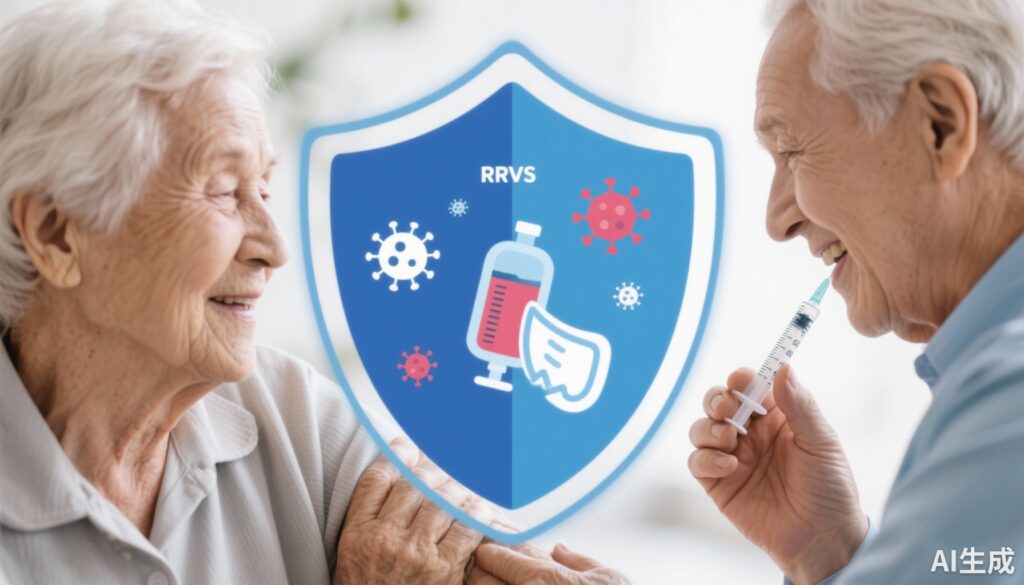Highlights
- RSV vaccines, particularly prefusion F protein-based formulations, show efficacy of approximately 75-85% against RSV-associated acute respiratory illness and lower respiratory tract disease in adults aged 60 and older.
- Vaccine effectiveness (VE) remains robust across elder subgroups but is moderately reduced among immunocompromised patients, especially stem cell transplant recipients.
- Safety profiles are favorable with no increased risk of immune thrombocytopenic purpura; a small but statistically significant increased risk of Guillain-Barré syndrome has been observed with the RSVPreF vaccine but not with adjuvanted formulations (RSVPreF3+AS01).
- Coadministration of RSV vaccines with seasonal influenza or COVID-19 vaccines is safe and elicits mostly non-inferior immune responses in older adults.
Background
Respiratory syncytial virus (RSV) is a substantial cause of morbidity and mortality among older adults, leading to hospitalizations and acute respiratory illnesses. Effective vaccination strategies for adults aged 60 years or older are critical to reduce RSV disease burden. Recent introduction of multiple RSV vaccines, including mRNA, protein subunit, and vectored vaccines targeting the prefusion (preF) conformation of RSV fusion glycoprotein, promises to fill this unmet need. Understanding their real-world effectiveness and safety during active RSV seasons guides clinical decision-making and public health policy.
Key Content
Vaccine Effectiveness and Clinical Trial Evidence
Multiple phase 2/3 randomized controlled trials (RCTs) and meta-analyses have established the vaccine efficacy (VE) of RSV prefusion F protein-based vaccines:
- mRNA-1345 Vaccine: In a large randomized, placebo-controlled phase 2-3 trial (NCT05127434), the mRNA-1345 RSV vaccine showed VE of 83.7% (95.9% CI, 66.0-92.2) against RSV lower respiratory tract disease with ≥2 symptoms and 82.4% (96.4% CI, 34.8-95.3) against disease with ≥3 symptoms in adults ≥60 years. VE against acute respiratory disease was 68.4% (95% CI, 50.9-79.7). The vaccine elicited strong rises in RSV-A and RSV-B neutralizing antibodies and preF binding antibodies, with immunogenicity consistent across subgroups including at-risk populations (Fry et al., 2023; PMID: 38091530).
- Ad26.RSV.preF RSV Vaccine: A phase 2b trial (NCT03982199) evaluating an adenovirus serotype 26 vectored RSV vaccine combined with preF protein demonstrated VE of approximately 75-80% against RSV-mediated lower respiratory tract disease in adults ≥65 years. Neutralizing antibody titers increased robustly post-vaccination, and the vaccine was well tolerated (PMID: 36791161).
- RSVPreF3/AS01 Adjuvanted Protein Vaccine: Interim results from a phase 3 trial in adults ≥60 years showed durable humoral and cell-mediated immune responses persisting for at least one year post single dose, with VE consistent with earlier phases. Mild to moderate reactogenicity was reported (PMID: 39052726).
- MVA-BN-RSV Vaccine: This modified vaccinia Ankara vectored vaccine provided moderate protection (~43-59% VE) against RSV-associated lower respiratory tract disease with at least 2 symptoms in adults ≥60 years but did not meet all prespecified success criteria, possibly due to suboptimal neutralizing antibody responses (PMID: 39461302).
- Meta-analyses and Systematic Reviews: A Cochrane review and recent meta-analyses confirm high-certainty evidence supporting the efficacy of RSV prefusion vaccines in older adults, with VE estimates around 77% for lower respiratory tract illness and 67% for acute respiratory illness. Safety data indicate no significant increase of serious adverse events (PMID: 41016728; PMID: 38878994).
Real-World Effectiveness and Safety in US Adults
A large-scale study utilizing electronic health records across the US (Fry et al., 2025; PMID: 40343698) evaluated real-world vaccine effectiveness and safety of RSV protein subunit vaccines in adults aged 60 years and older during the 2023-2024 season:
- Effectiveness: Among 787,822 patients tested for RSV, overall VE was 75.1% (95% CI, 73.6%-76.4%) against RSV-associated acute respiratory illness. VE was consistent across age strata (60-74 years and ≥75 years) and clinical severity including urgent care and hospitalization outcomes.
- Immunocompromised Subgroups: VE was moderately reduced in immunocompromised patients, ranging from 67.0% to 73.1%. The lowest VE observed was in stem cell transplant recipients (29.4%-44.4%), indicating these patients may need additional protective measures.
- Safety: Analysis of 4,746,518 vaccine recipients revealed no increased risk of immune thrombocytopenic purpura post-vaccination. However, a small but statistically significant increase in Guillain-Barré syndrome cases was noted with the RSVPreF vaccine (18.2 excess cases per 1 million doses), whereas no elevated risk was seen with the adjuvanted RSVPreF3+AS01 formulation (5.2 excess cases per million doses).
Immunogenicity and Correlates of Protection
Immunologic analyses from pivotal trials indicate that neutralizing antibodies (nAbs) to RSV-A and RSV-B and prefusion F binding IgG are strong correlates of protection against RSV lower respiratory tract disease and acute respiratory disease (PMID: 40610413). Humoral responses post-vaccination demonstrate 7- to 12-fold increases in neutralizing titers, persisting for at least 6 to 12 months.
Co-administration with Influenza and COVID-19 Vaccines
Phase 3 trials demonstrate that coadministration of mRNA-1345 RSV vaccine with seasonal influenza vaccine (SIIV4) or SARS-CoV-2 mRNA vaccines is safe and maintains mostly non-inferior immunogenicity compared to individual vaccine administration (PMID: 39608389; PMID: 37992000). This strategy may improve vaccination adherence and reduce healthcare visits.
Expert Commentary
The compiled evidence emphasizes that RSV prefusion F protein-based vaccines are effective and generally safe for adults aged 60 years and older, aligning closely with efficacy observed in clinical trials and real-world settings. The reduced VE in immunocompromised adults, particularly stem cell transplant recipients, highlights an area for focused research and possibly adjunctive prophylaxis. Although Guillain-Barré syndrome risk post-vaccination is statistically increased with certain vaccine formulations, absolute risk remains very low. Clinicians should counsel patients accordingly and monitor for neurological symptoms post-vaccination.
Mechanistically, prefusion F protein vaccines elicit potent neutralizing antibodies targeting prefusion conformation epitopes critical for viral entry, underpinning their high effectiveness. Sustained humoral and cellular responses support protection through RSV seasons. Coadministration with influenza and SARS-CoV-2 vaccines, without significant immunogenicity compromise, offers pragmatic benefits, especially in older adults with multiple comorbidities.
Remaining challenges include evaluation of long-term durability beyond 1 year, efficacy against diverse RSV strains and subtypes, and optimization of vaccination strategies in immunosuppressed populations. Ongoing clinical trials such as DAN-RSV (NCT06684743) will further elucidate vaccine impact on cardiorespiratory hospitalizations and all-cause mortality, informing public health policies.
Conclusion
RSV vaccination with prefusion F protein-based formulations offers substantial protection against RSV-related acute respiratory illness and lowers respiratory tract disease in adults aged 60 years or older. The vaccines are generally well tolerated, with acceptable safety profiles, though vigilance for rare adverse neurological events is necessary. Immunocompromised individuals exhibit reduced vaccine effectiveness, emphasizing the need for tailored preventive approaches. Evidence supports coadministration with influenza and COVID-19 vaccines to enhance population coverage. These data critically inform clinical practice, vaccination guidelines, and ongoing research priorities to mitigate RSV’s burden in older populations.
References
- Fry SE, Terebuh P, Kaelber DC, Xu R, Davis PB. Effectiveness and Safety of Respiratory Syncytial Virus Vaccine for US Adults Aged 60 Years or Older. JAMA Netw Open. 2025 May 1;8(5):e258322. doi: 10.1001/jamanetworkopen.2025.8322. PMID: 40343698; PMCID: PMC12065041.
- Moderna. Efficacy and Safety of an mRNA-Based RSV PreF Vaccine in Older Adults. N Engl J Med. 2023 Dec 14;389(24):2233-2244. DOI: 10.1056/NEJMoa2307079. PMID: 38091530.
- Munoz FM et al. Efficacy and Safety of an Ad26.RSV.preF-RSV preF Protein Vaccine in Older Adults. N Engl J Med. 2023 Feb 16;388(7):609-620. DOI: 10.1056/NEJMoa2207566. PMID: 36791161.
- Boutin M et al. Immunogenicity and Safety Following 1 Dose of AS01E-Adjuvanted RSV Prefusion F Protein Vaccine in Older Adults: Phase 3 Trial. J Infect Dis. 2024 Jul;230(1):e102-e110. DOI: 10.1093/infdis/jiad546. PMID: 39052726.
- Nouri S et al. Safety and Immunogenicity of mRNA-1345 RSV Vaccine Coadministered with Influenza or COVID-19 Vaccine in Adults ≥50 Years. Lancet Infect Dis. 2025 Apr;25(4):411-423. DOI: 10.1016/S1473-3099(24)00589-9. PMID: 39608389.
- Slipsager M et al. DAN-RSV Protocol: A Pragmatic Trial Evaluating Bivalent RSV PreF Vaccine Effectiveness in Adults ≥60 Years. Am Heart J. 2026 Jan;291:14-25. DOI: 10.1016/j.ahj.2025.07.068. PMID: 40738309.
- Pellini R et al. Efficacy and safety of respiratory syncytial virus vaccines: Cochrane Database Syst Rev. 2025;9(9):CD016131. DOI: 10.1002/14651858.CD016131. PMID: 41016728.



